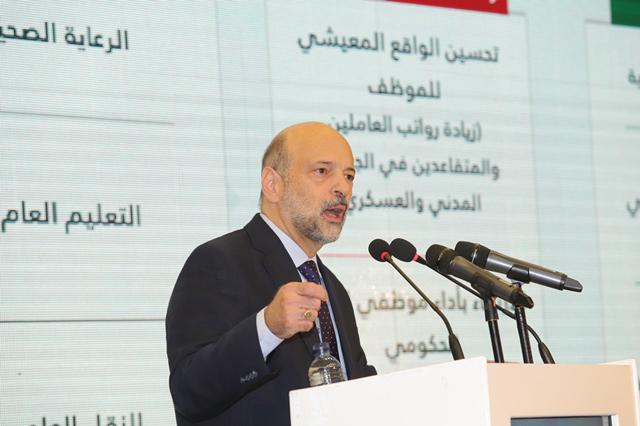You are here
Gov’t to roll out 2nd incentive package to stimulate economy
By JT - Nov 17,2019 - Last updated at Nov 17,2019
AMMAN — The government on Monday will launch the second executive package of its recently unveiled comprehensive programme to stimulate the economy.
A new series of stimulus measures and decisions on vital sectors to complement the first package to boost economy and investment, alongside a set of managerial and financial reform procedures, will be announced during a ceremony to be held at the Royal Cultural Centre in Amman, in the presence of Prime Minister Omar Razzaz and his ministerial team.
The second phase will include the integration and cancellation of independent entities, which fall within governmental efforts towards economic reform, which it has embarked upon with the aim of improving the public sector's performance and services, as well as efficiently budgeting and remedying administrative shortfalls and red tape.
The governmental measures are part of its comprehensive economic programme, which includes packages that come in phases with the aim of achieving a “qualitative leap” for the national economy to improve living standards and services, in compliance with His Majesty King Abdullah's directives, the Jordan News Agency, Petra, reported.
In October, the government launched the first package of the economic stimulus plan.
The blueprint comprises four aspects: Stimulating the economy and investment, management and financial reform, improving citizens’ livelihood and improving services comprehensively.
The comprehensive programme is a manifestation of His Majesty King Abdullah’s Royal directives that focus on citizens’s livelihood and how the programme will improve it, as well as its implementation within a time frame.
In regards to improving livelihoods, the prime minister had said that this aspect requires its own root solutions, noting the need for reconsidering many regulations, especially the Civil Service Bureau by-law to overcome unemployment.
Regarding the fourth aspect of improving services, the prime minister had said that the government will focus on a comprehensive shift rather than the current approach of improving certain areas or details, noting that “this is the hardest aspect because, regardless of the sector, it requires improvement of infrastructure, investment and the reinvigoration of quality services, which we will work on”.
Referring to education, Razzaz had said that kindergarten education must be made compulsory for all.
“As of the academic year 2020/2021, education for five-year-olds will be compulsory, and two years after that, it will become compulsory for four-year-olds, which is something that no Arab country has done before, and it will be a challenge that we need to face...,” the premier noted.
Razzaz said that a special programme will be drafted for comprehensive health insurance, under the directives of His Majesty, which should be completed by 2023.
As for the issue of insolvency, Razzaz had said that previously, when provisional attachment was implemented, all the assets of a debtor were seized, even if their value was more than the value of the debt. Now, the premier said, changes will make provisional attachment apply to assets with a value equal to the exact amount of dues owed to a creditor.
“By the beginning of 2020, all aspects will be completed, except for improving services,” Razzaz said.
The set of regulations to work on the first aspect has focused on the real estate and housing sector, the production and export sectors and the employment of Jordanians.
Related Articles
AMMAN — The government will adopt a new approach to deal with the 2020 budget in regards to partnerships with Parliament and utilising commi
AMMAN — More than 50 per cent of the government's capital spending in 2019 will go to the education, health and transport sectors, Prime Min
AMMAN — The Cabinet on Wednesday decided to expand exemption measures and lower the registration and purchase fees of apartments and lands.&















